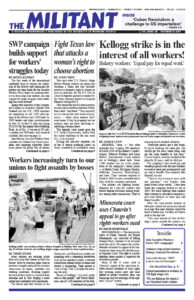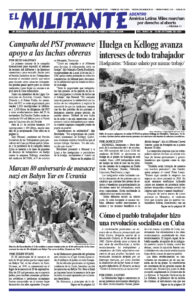October 28, 1996
WASHINGTON, D.C. — “No human being is illegal!” appeared on countless hand-lettered signs among the thousands of demonstrators who converged October 12 for the first national demonstration for the rights of immigrants.
Mexican, Chicano, Puerto Rican, and other Latino student groups played a major role in organizing buses, vans, and cars to get to the demonstration. The march marked the increased confidence of many immigrant workers in resisting government and employer attacks.
One speaker who received a particularly warm response was Baldemar Velázquez, president of the Farm Labor Organizing Committee. Describing how farm workers organized FLOC over the years, Velázquez said, “We didn’t wait for the politicians. We didn’t wait for the AFL-CIO. We started organizing the brothers and sisters. We said: We fight now. We can’t wait for later.”
October 29, 1971
The special meeting held in the Colorado State Penitentiary at Canon City Sept. 29, where a dozen candidates and supporters of the Colorado Socialist Workers Party discussed their election platform with several hundred potential supporters, sets an example for prisons throughout the country.
The real issues facing prisoners were discussed, and alternatives were presented. Concrete ideas for how to struggle effectively and win were debated.
However, prison authorities refused to let the candidates bring their campaign newspaper, the Militant, to distribute. The right to uncensored mail and reading material, including books, magazines and papers, are among the rights for which prisoners are today courageously fighting. Part of this fight is for the right of the Militant to be distributed within prison walls. It is a right we intend to win.
October 26, 1946
NEW YORK — With the refusal of the Supreme Court to hear the case of 217 Indonesian seamen who are incarcerated in a Texas detention camp, these men may be deported within 30 days.
The seamen were arrested almost a year ago, because they walked off Dutch ships in New York harbor. The ships were loading American-made arms and ammunition to be used by the Dutch despots against the Indonesian fighters for freedom. The seamen refused to transport arms designed to shoot down their own countrymen.
After six months’ imprisonment in Ellis Island, the seamen were shipped to San Francisco, together with a score of Indonesian residents, rounded up by the government as reprisal against the seamen’s action. The Indonesia League of America is demanding the men remain here as political refugees pending the outcome of the struggle in Indonesia.

